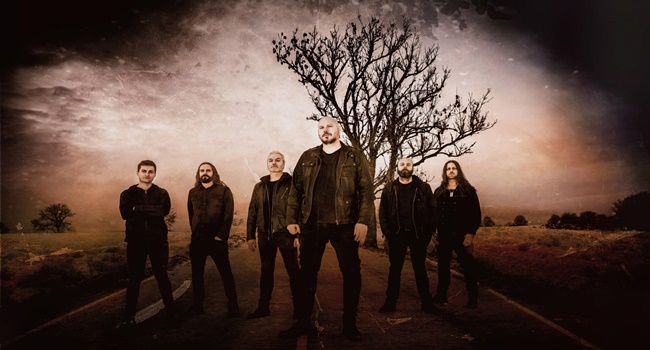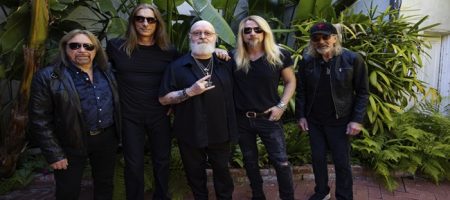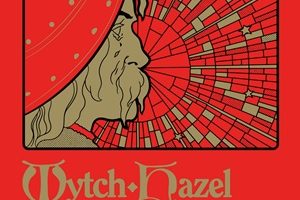Soilwork – Relating to Abandonment
Sunday, 21st August 2022
It’s no secret that for most of the staff at this site, Soilwork is a band that has always gained appreciation for their deep catalog and contributions to the heavy metal community. A new album always garners deep intense listening sessions, usually receiving playbacks even years down the line. Such will be the case for this latest record Övergivenheten – a fourteen track journey that contains epic melodies, more catchy hooks, and diverse songwriting that can be magically catchy (“Nous Sommes La Guerre”) as much as vicious/brutal against melodic resonance contrast (“This Godless Universe”).
We always appreciate the chance to speak to vocalist Björn ‘Speed’ Strid, who was more than happy to let us into the Soilwork approach for this album. You’ll learn about the differences relating to the recording sessions for the record, the abandonment theme and how personal life circumstances creep into the lyrics and music, the current band chemistry and what new blood has done to energize the group, reflections on life, touring plans, plus a bit of talk regarding The Night Flight Orchestra in the mix.
Dead Rhetoric: The latest Soilwork album Övergivenheten is another incredible record for the band. How do you feel about the work behind this effort – does the process get any easier this deep into your career, especially considering what everyone went through with the extended downtime due to the pandemic?
Björn ‘Speed’ Strid: Well, that’s a good question. It definitely gave us some extra time on our hands. I think that might have been good in the end. Cause we did spread out the recording sessions, we were able to get some distance to the songs that we recorded. We did a week in there, then a long week in there, we had a total of four recording sessions. Personally, I decided to just shut the door as soon as we were done and not listen back, not ask for any rough mixes or anything. Just let them sort of marinate and come back to them, and it was an interesting experiment. Coming back to the songs, it was almost like I have forgotten what we had recorded, you know (laughs). Wow, this is what we recorded, and this is amazing! And I know what I am going to do for that part – that wouldn’t have happened if we were recording these songs for six weeks straight like we normally do.
And I also think having some time off. It was really the first time in twenty years that we stopped. I got to know that other guy, that is not on stage all the time, you know? And summarize and digest what we have been doing these last twenty years. That also did something where I could connect on a different level emotionally when writing the songs. It took some time for me to get into it. First I needed a break, I didn’t want to approach a new album. I came in quite late into the process with writing my songs. Once I did, I sort of had to force open that door a little bit. And that was scary. What if I’ve lost it? Once I opened the door, a lot of amazing things came out. I was able to connect on a different level, especially with the melodies they just came pouring out. I think you can feel that as well – there are some really epic melodies throughout this album.
It did something for sure. And I am sure the other guys can relate (to this) as well.
Dead Rhetoric: Do you notice the distinctions between your songwriting and David’s songwriting now that he’s been in the band for a while, as you both are the primary songwriters now for Soilwork?
Strid: Especially on this album, there is quite a difference. I think it has to do with us being on different phases of our lives. David has been through a really, really rough patch. And going through some of the darkest times of his life. Meanwhile, my situation is quite stable, and has been so for the last few years. I feel pretty damn good, and I don’t have to lie one bit to say that which is very relieving in many ways. At the same time, it hurts to see somebody you know so well and close with to go through something like that, and still ongoing. It is sort of hard to find a mutual vision musically to make this album, because we have been on different planets mentally. His stuff has been quite dark, almost destructive. I felt like I needed to step in and creating something that is very empowering and uplifting. I never close any doors to the darkness, because it is also a part of our sound.
It’s life. I don’t believe in shutting doors and pretend that dark thoughts and dark feelings don’t exist, because it’s not realistic. I’ve been trying to sort of be the rock, find a mutual bond with David and everybody else. David and I write most of the songs, but we are a band in the studio, and it’s been quite a beast to record this album. I think the contrast you hear between some of the songs is also what makes it quite magical and very sincere. It’s a very true representation of the band and where we are at right now, as people and as musicians.
Dead Rhetoric: The overall theme of the album relates to abandonment – the push and pull of being abandoned, abandoning others, and the personal struggles/social difficulties that certain band members faced during the process. Discuss how you approached the lyrical content this time around – and how you channel these real-life experiences in such a relatable way to the listeners?
Strid: It’s quite personal stuff. I guess you can also sense a difference between mine and David’s lyrics as well. I have been writing a lot about him as well, and he’s done the same with me in the past, which is quite interesting. It’s like an exchange, I see what he is going through, and it causes a lot of emotional inferno being around it. I had to channel those emotions.
As far as the title of the album, Övergivenheten, it means abandonment as you mentioned. I wouldn’t say it’s a concept album in that sense, but we wanted to find a word that is very powerful in Swedish and that most of us can relate to, and that also rhymes and connects with the melodies that run through the album, which we feel are very Scandinavian melancholic. It’s a special melodic language. Abandonment is a word that most of us can relate to. The fear of being abandoned, and also the fear of abandoning something or someone. Sometimes abandonment can be something positive, something you have to go through in order to get to a better place. It’s never easy.
If we had named the album Reality, it would not have been an exciting thing. Reality is overused in metal, abandonment, not so exciting either. There’s a certain charm to it to name an album in your native tongue. As I’ve seen, it’s very much of a tongue twister for all the poor journalists to pronounce it in every interview (laughs). Some people think we do this on purpose just to piss off the journalists – but no, I promise we are not that cruel. We wanted to continue on the path naming our albums with a Swedish title but pick a word that a lot of people can relate to.
Dead Rhetoric: What can you tell us regarding the artwork for the album? I definitely feel it’s quite different in terms of composition and outlook versus most metal records these days…
Strid: Yeah, it definitely sticks out. It was David’s idea to have something hand drawn. At first I was like, huh, hand drawn – I don’t know. Let’s give it a shot, and his friend did this drawing, and we gave him some keywords. I wanted to have these trees like in an alley, those trees are very typical in the southern part of Sweden where I am from, they look quite desolate, and it sort of connects with the title as well. And then the bird – it was just black and grey, but we experimented with the colors. The bird became the centerpiece that sort of symbolizes the hope in all of this. Everything around is black, blueish, greyish things. At first, it might not seem like much of a cover but the more that you look at it, it sucks you in I feel. I really like the way that it turned out, the fact that it sticks out quite a bit in the metal world.
Dead Rhetoric: Where do you think you’ve seen the greatest transformations in terms of the output, songwriting, or style changes for Soilwork from the early days of the band until now?
Strid: It’s been an interesting journey for sure. We all know there have been quite a few lineup changes through the years. I’ve said it before, we’ve been lucky with new people coming into the band, that brought something interesting to the table that still understood the things we want to express musically and lyrically with this band. David was one of those people – he started touring with the band in 2007, and he joined as a full-time member for The Living Infinite, and Peter jumped off the band a second time. David inspired me to pick up the guitar and start writing songs, that’s really what happened with that album. It’s quite crazy, one of the original members quits the band, let’s make a double album! That’s quite insane, we managed to do that and I’m quite proud of that album. We could have received more attention, that album kind of went under the radar with some people. That experiment that this album was is crucial to where we have developed right now. It gave me the confidence to write more songs on guitar.
As a singer, both Sylvain and David threw me some stuff that I’m not used to and made me step outside my comfort zone as a singer as well. That also led into new and interesting things.
Dead Rhetoric: What have you changed your mind the most about – either when it comes to your personal life or musical career – over the past three to five years?
Strid: Hard to say. I’m going to be 44 years old in September. I think the latest two years, to sum it all up, the life I had been living was not what I expected it to be. I never had any plans of becoming a touring musician, or a professional musician. I was a hockey player, and then I randomly became a singer. I always loved music, playing guitar, but a singer – no. It happened so quickly, the latest two years I’ve been able to tie it all together and get some kind of look at it in an objective way. Digest what it is I have become. So much experience of being on the road, I’ve become an adult being on the road. It’s a very special life for sure.
That needed some time of to actually deal with that. I think that was the most defining two years that have passed. That I was actually able to walk up on a stage again. These festivals after two years – I can enjoy it more. I can feel a lot more things. I can look into people’s eyes and the crowd and really connect on a whole different level. That’s another thing that this break helped with. I think it’s been quite healthy.
Dead Rhetoric: Have you been surprised by the success and acceptance of what you are doing not only with Soilwork, but your work within The Night Flight Orchestra as well as the At the Movies project that took off like gangbusters during the lockdown of 2020 and 2021? Do you believe this speaks to a more open-minded musical climate where people are willing to accept artists who feature themselves in different styles if they have the ability, talent, and conviction to pull this off?
Strid: Yeah, I think there is an acceptance on a whole different level in recent years, I feel. I guess I expected to get a lot more shit thrown at me for creating The Night Flight Orchestra and actually making it another band. For me it’s really 50/50 now between that and Soilwork, as far as priorities go. I think people can sense that, and also they feel that I’m very serious about it even with all the tongue in cheek stuff going on with TNFO at the show. We are 100% serious about the music and writing the songs.
As far as metal fans go, they are very good at seeing through things when it’s not done with 100% sincerity. There is a different acceptance today, it doesn’t matter if it’s something else. If they feel that you really mean it, it’s accepted in a different way than maybe it would have been in the mid-2000’s.
Dead Rhetoric: What is the worst advice you see or hear being dispensed in the music industry relating to heavy metal? And conversely – what’s the best piece of advice you ever received that applies to your philosophy or musical career?
Strid: Wow. That’s a very good question. We live in a time where there’s a lot of YouTube musicians being graded on a daily basis. That’s all amazing, but it’s almost like the personal expression has sometimes taken a step aside, instead of just being able to imitate something. I don’t know if anybody is sort of promoting that or giving advice, but I think we live in a society where trying to imitate something and pulling that off is more important than actually the personal expression.
That goes both ways. We should encourage kids to find their own personal expression. We all have our idols, and we want to imitate our idols, then again, it’s not about that in the end. It’s the steppingstone, and then you need to find your own expression. That doesn’t have to be anything that special, or that crazy. Put your print and mark on it.
Dead Rhetoric: How would you describe the band chemistry and its importance these days around the six members of Soilwork? As I’d imagine there’s definitely a different energy shift having a relatively new rhythm section since Bastian joined in 2017 and Rasmus officially joined this year (although he was a part of the live band since 2019)?
Strid: Don’t they always say, we’ve never been better, the vibe has never been better. It’s very much true. I think it just takes time. Then again, back to the lineup changes. There have been quite a few lineup changes, and it took some time before we really found the real chemistry and being able to be ourselves and open to everyone in the band without feeling sort of losing the integrity. It’s an interesting journey, it’s hard to spend one life with just one person – do that with six people for that long, it’s only natural that some people can’t handle it and drop off. You run into trouble, in the end. I feel the vibe of the band is really good.
Having Bastian come into the band and give us all a slap in the face. Sort of like what the hell have you done to this band? More like organization-wise. He’s young, he’s 30 years old. He came in and stirred things up. Did some really amazing things, structured things up. Started taking care of the social media, he did wonders, and that’s exactly what we need. I’m not stubborn, I’m not going to be that guy that’s like ‘who do you think you are, I’ve been in this band for twenty years!’ No Bastian, you are 100% right- and thank you for saying that. He’s done some magic to this band – and what a drummer. He has developed in these latest years like nobody else I’ve ever seen. It’s just amazing what has done on the albums.
We are quite different as people, but we get along very well. We can be in the same room, all of us, and it’s not awkward, and that’s a victory.
Dead Rhetoric: What’s left on the bucket list for yourself to accomplish that you haven’t quite achieved as of yet – either in Soilwork or any of your other musical endeavors?
Strid: I would like to tour with Judas Priest, Soilwork and Judas Priest. That would be amazing. And Rob Halford was a supporter at a very early stage with Soilwork, and it would make things full circle.
Dead Rhetoric: What’s on the agenda for Soilwork over the next twelve months in terms of touring, festivals, etc.?
Strid: We have a bunch of festivals to do. Now in August and September. The traffic in Europe right now, it’s insane. Nobody can afford to go to a show every day of the week. We decided to do the festivals, do Australia in November as well, but go on a full tour in Europe and America, we will wait until next year. Hopefully things have slowed down a little bit by then. I heard somewhere that there are four times as many shows booked this summer compared to 2019, and that says a lot.
People seem to dig the new The Night Flight Orchestra single, and there will be a new video coming out for that as well. We have performed the song live at Wacken for the first time as well, that was mind-blowing.




























